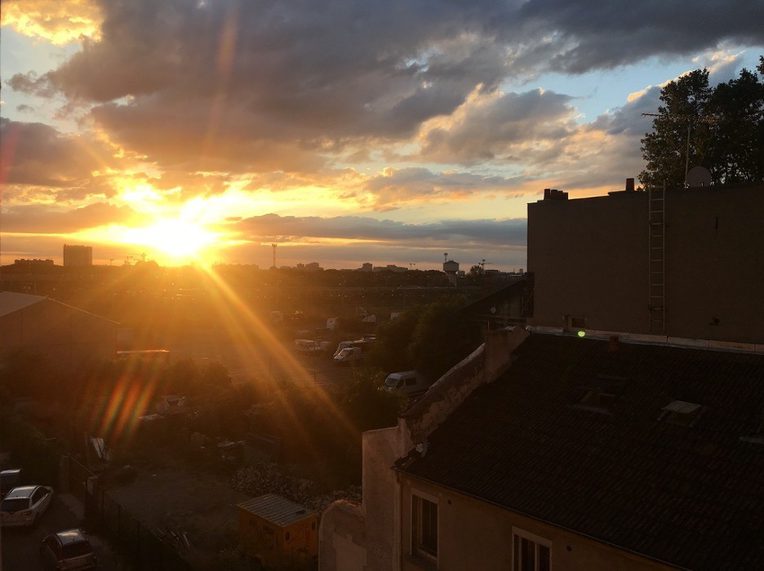Between Joy and Nostalgia: A Story of Venezuelan Musicians in Paris
From the Series: Art and Ethnographic Forms in Dark Times
From the Series: Art and Ethnographic Forms in Dark Times

We were laughing hard, our torsos bent over our aching bellies, our faces stretched into big smiles. This uncontrolled laughter was the palpable ruins into which our music had collapsed. We were trying to recreate the Venezuelan popular song El Espanto (The Phantom). Angel, Alma, Antonio, and I sang, while Julia was on the cuatro.
Mas allá de no sé donde, tampoco se sabe cuando dicen que sale un espanto
(Beyond we don’t even know where, nor even when, a phantom came out)
We had only gotten through a couple of lines before our wobbly coordination had most of us giggling too hard to keep going.
Era un muerto sin cabeza, sin pantalón, ni camisa, con las manos en el bolsillo y una macabra sonrisa
(He was a dead man without a head, without pants nor a shirt, with his hands in his pocket and a macabre smile)
The funny lyrics of this line were too much to handle, simultaneously precipitating and announcing the final disintegration of our song. The rhythm of our laughter overwhelmed the rhythm of the music. The collective energy that enveloped us led to the breaking down of language.
We were sitting side by side on the couch, squished together. At night, the couch was turned into a bed—actually two beds, once its cushions were laid down on the floor. As it was, it took up a third of the room, one of two rooms in the small apartment. My big suitcase also took up precious space. In the summer of 2018, I was spending the night in Paris en route to the United States from Sofia, Bulgaria, my hometown.
The roots of our laughter and shared memories ran deep, all the way across the ocean to Venezuela, where we had all met. Two cousins—Angel, a violinist, and Alma, a percussionist—played in the same youth orchestra. The orchestra was part of El Sistema, a Venezuelan initiative that aims to provide free classical music education and instruments to almost a million young people on the urban margins. I also knew Julia from Venezuela. She played the viola. She had become close friends and roommates with Alma, when, four years ago, they had both immigrated to Paris to escape the crisis in Venezuela. This was around the same time that I had concluded my sixteen months of Caracas-based fieldwork. Neither they, nor I, had been back since. Their families still lived there, relying largely on remittances sent by their children to make ends meet in a country with soaring inflation. Foreign currency used to go a long way in Venezuela. Today, it does not. Nearly five million people fled the country between 2015 and 2019 (Bahar and Dooley 2019), one of the greatest migration phenomena in the world.
The paths of dreams forged by El Sistema musicians did not follow the great waves of immigration spilling out of Venezuela, which predominantly took people to neighboring Latin American countries. Instead, Paris was attractive to the Venezuelan musicians because of the high quality of music education available there, and because, within the boundaries of Europe, France maintained the easiest immigration requirements. A number of El Sistema musicians were already established in the city. New arrivals were held by a musical web of solidarity and support, spun already back when they played in the same orchestra and survived on the streets of Caracas. Theirs was the age-old dream of the Latin American intellectual in Paris, immortalized in literature by Borges and Cortázar.
When my friends first shared their idea to move to Paris, I was skeptical. How could their plans work out in Paris, an expensive cosmopolitan city with an immigration and asylum system that privileged “the suffering body” (Fassin 2001, 2011; Ticktin 2014)? Would this system accommodate people who were escaping a humanitarian crisis not just to survive at any cost but specifically to follow a dream?
The musicians proved me wrong, however. Once in Paris, they enrolled in musical conservatories. They made a living by working odd jobs. They found apartments in the center of the city. At great cost, they fought to make space for their dreams to unfurl on a daily basis, to acquire a form not predetermined by the unrelenting pressure of social forces.
But the dreams had lost some of their momentum. “For the first time in my life I feel stalled,” Demian, an oboe player, told me. He explained that he could feel the limits of where his dreams could take him. At El Sistema, he had graduated up the ranks of the program. In France, he was admitted to study in several prestigious conservatories. Finding a job as a professional musician in an established orchestra in Europe was extremely competitive, however. Demian was starting to realize that if he wanted a stable income, he might not succeed as a performing artist. This confession, uttered in the midst of a COVID-19 lockdown, reflected how the pandemic measures were affecting even world-class musicians. The pressure on those with a precarious legal and economic status was infinitely greater.
“We were happy and we didn’t know it,” El Sistema musicians in Paris often repeated, appealing to the power of a shared past to animate our present. This phrase popped up in everyday conversations and in Facebook reposts of memories, mostly from their El Sistema orchestra world tours. This expression, widely used by Venezuelans, expressed nostalgia. It was a symptom of lives radically transformed by a political and economic crisis. For those who belonged to El Sistema, it gestured to a time when the institution, with all its flaws, had provided stability and predictability. To a time when they lived close to family. To a time when the aspiration to leave Venezuela was untainted by the hard realities of what would become the circumstances of its realization.
In their nostalgia, they did not long for the past in its totality (see also Boym 2007; Dlamini 2009). They were still critical of the government. They were still critical of El Sistema, how the institution had grown too narrow for the full expression of their artistic creativity. Rather, they were yearning for strands of joy that marked their past and that they recreated, with music, in the present. Music, and laughter, were their material remnants.
A joy rooted in connection was always latent, about to erupt. This joy was soaked through with longing for a lost home, with the energy of dreams that had lost their fire. But this joy rose up with dignity, with the power to give lives a different shape from the one stamped onto them by injury.
We were laughing so hard it hurt.

Bahar, Dany, and Meagan Dooley. 2019. “Venezuela Refugee Crisis to Become the Largest and Most Underfunded in Modern History.” Brookings, December 9.
Boym, Svetlana. 2007. “Nostalgia and Its Discontents.” Hedgehog Review 9, no. 2.
Dlamini, Jacob. 2009. Native Nostalgia. Auckland Park, South Africa: Jacana Media.
Fassin, Didier. 2001. “The Biopolitics of Otherness: Undocumented Foreigners and Racial Discrimination in French Public Debate.” Anthropology Today 17, no. 1: 3–7.
———. 2011. “Policing Borders, Producing Boundaries: The Governmentality of Immigration in Dark Times.” Annual Review of Anthropology 40: 213–26.
Ticktin, Miriam. 2014. “Transnational Humanitarianism.” Annual Review of Anthropology 43: 273–89.